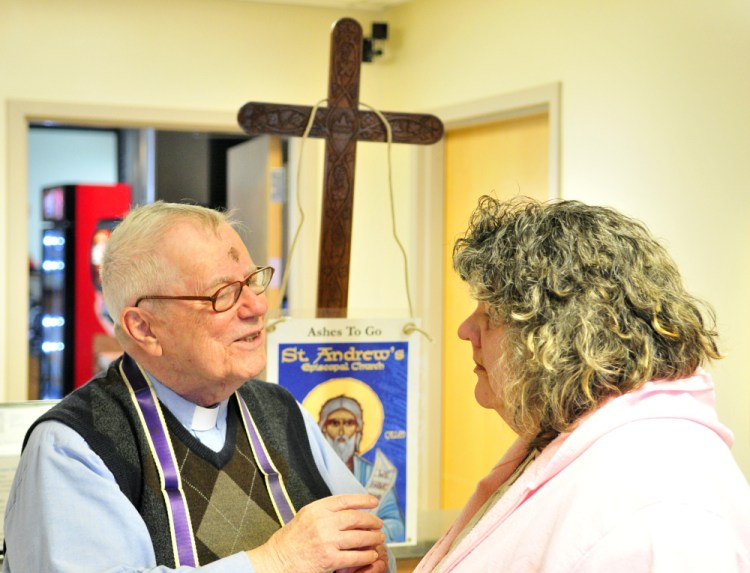WINTHROP — For nearly four hours Wednesday, the Rev. James Gill sat with his sign and his jar of ashes in the lobby of the Commerce Center, ready to dispense the ashes that Ash Wednesday is named for.
People walked by, intent on getting out of the damp, cool air outside, headed either to the cafe or to a doctor’s appointment in one of the offices upstairs in the converted mill space. Some avoided eye contact and others said hello as they passed. All had the chance to get ashes if they wanted to.
In Christianity, the season of Lent starts with Ash Wednesday and lasts about six weeks. It’s considered a penitential season during which believers often give up luxuries or treats, and fast and pray to prepare for Easter and the observance of the resurrection of Jesus Christ.
Although he’s retired, Gill in recent years has spent part of his Ash Wednesday taking the rite out of the church and into the community as part of the annual Ashes To Go event. This year, Ashes To Go took place across the country and in Canada, the United Kingdom and Germany. In Maine, Ashes To Go was expected to be available in at least eight other communities, including Portland, Bath, Waterville, Brunswick and Farmington.
By midday in Winthrop, about a dozen people had stopped by Gill’s perch by the door. Some he knew, and others he had not seen before.
“A couple of people hugged me and thanked me, which is always nice,” he said. “A hug goes a long way.”
Early on, he had help from Tom Ward, a senior warden at St. Andrew’s Episcopal Church in Winthrop, who invited people to accept ashes and hear Gill say, “Remember that you are dust and to dust you shall return,” as he marked their foreheads.
That’s a reminder of mortality, Gill said, and at 87, mortality is something he thinks of more and more.
In the afternoon, when the stream of passers-by slowed, Gill was content to sit and reflect a little on penitence, because the ashes are a sign of that as well.
“It’s not self-flagellation,” Gill said. “It’s kind of an inverse humanism to say you are the worst sinner going.”
Instead, it’s an ongoing reflection. He invoked St. Ignatius of Loyola and the belief that life is a dance.
“If you step to the left, it’s desolation; and if you step to the right, it’s consolation,” he said. “At the end of the day, if I am thinking about it, I wonder which way I have taken steps in the day.”
It’s easy to identify sins of commission, but it’s less easy to define sins of omission — what you could have or should have done, but didn’t, he said. Moving past those sins requires a period of reflection or meditation, something that Gill practices regularly.
Two of the people he marked with ashes stopped by briefly as they were leaving the Commerce Center to remind Gill that they should put their hallelujahs away for the Lenten season.
“That’s right,” Gill said. “We don’t have those again until Easter Eve.”
Gill, who bore the mark of ashes on his own forehead, planned to attend the St. Andrew’s Ash Wednesday service at 5 p.m., at the Quaker Meetinghouse where the St. Andrew’s congregation meets, where it was possible that church members would drop pieces of paper with hallelujah printed on them into a basket in yet another symbol of the solemn season.
“I’m not leading the service,” he said, “but I will have a pew’s-eye view of it.”
Jessica Lowell — 621-5632
Twitter: @JLowellKJ
Send questions/comments to the editors.



